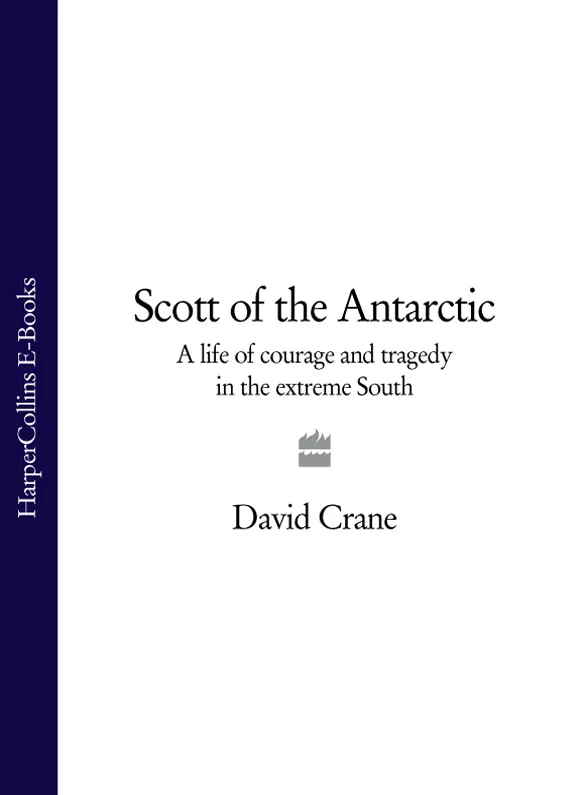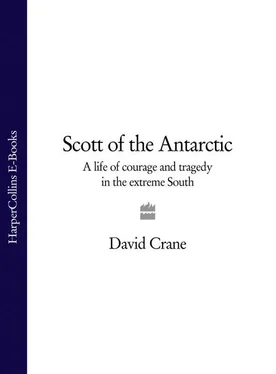
SCOTT OF THE ANTARCTIC
DAVID CRANE

COVER
TITLE PAGE SCOTT OF THE ANTARCTIC DAVID CRANE
MAPS MAPS The known extent of Antarctica in 1893 Present-day Antarctica Ross Island and McMurdo Sound Scott’s Southern Journey, November 1902–January 1903 Frustration: Mist obscured the view up the inlet to a Nunatak that would have shown them that it was a glacier The Conquest of the Western Mountains The Discovery Expedition, 1901–04 Disaster: February – March 1911 Polar Journey, 1911–12
NOTE ON DISTANCES, TEMPERATURES AND WEIGHTS NOTE ON DISTANCES, TEMPERATURES AND WEIGHTS Unless stated, all distances are given in geographical (i.e. nautical) miles. One geographical mile equals 1.15 statute miles, or c .2,025 yards (1,852 metres). Temperatures are given in Fahrenheit and weights in imperial measures.
1 St Paul’s, 14 February 1913
2 Childhood and Dartmouth
3 Scott’s Navy
4 Crisis
5 Enter Markham
6 Preparations
7 South
8 Into the Ice
9 Harsh Lessons
10 Antarctic Night
11 Man Proposeth … God Disposeth
12 The Southern Journey
13 Survival
14 A Second Winter
15 Last Season
16 A Long Wait
17 Escape from the Ice
18 The Reluctant Lion
19 The Pull of the South
20 Of Lions and Lionesses
21 Marking Time
22 Making Ready
23 South Again
24 Challenges
25 Return to the Ice
26 Depot-Laying
27 Disaster
28 Winter
29 The Barrier
30 Without Priority
31 Ars Moriendi
P.S. IDEAS, INTERVIEWS & FEATURES …
ABOUT THE AUTHOR
ABOUT THE BOOK
READ ON
EPILOGUE
SELECT BIBLIOGRAPHY
INDEX
ACKNOWLEDGEMENTS
ABOUT THE AUTHOR
NOTES
PRAISE
BY THE SAME AUTHOR
COPYRIGHT
ABOUT THE PUBLISHER
The known extent of Antarctica in 1893
Present-day Antarctica
Ross Island and McMurdo Sound
Scott’s Southern Journey, November 1902–January 1903
Frustration: Mist obscured the view up the inlet to a Nunatak that would have shown them that it was a glacier
The Conquest of the Western Mountains
The Discovery Expedition, 1901–04
Disaster: February – March 1911
Polar Journey, 1911–12
NOTE ON DISTANCES, TEMPERATURES AND WEIGHTS
Unless stated, all distances are given in geographical (i.e. nautical) miles. One geographical mile equals 1.15 statute miles, or c .2,025 yards (1,852 metres). Temperatures are given in Fahrenheit and weights in imperial measures.
ONE St Paul’s, 14 February 1913
I am more proud of my most loved son’s goodness than for anything he has done and all this glory & honour the country is giving him is naturally a gratification to a Mother’s heart but very little consolation – you know how much my dear son was to me, and I have never a bitter memory or an unkind word to recall.
Hannah Scott, 21 February 1913
Your children shall ask their fathers in time to come, saying ‘What mean these stones?’
Joshua IV. 21. Scott Memorial, Port Chalmers, New Zealand
IN THE EARLY HOURS of 10 February 1913, an old converted whaler ‘crept like a phantom’ into the little harbour of Oamaru on the east coast of New Zealand’s South Island and dropped anchor. For many of the men on board this was their first smell of grass and trees in over twenty-six months, but with secrecy at a premium only two of her officers were landed before the ship weighed anchor and slipped back out to sea to disappear into the pre-dawn gloom from which she had emerged.
While the ship steamed offshore in a self-imposed quarantine, the officers were taken by the nightwatchman to the harbour master’s home, and first thing next morning to the Oamaru post office. More than two years earlier an elaborate and coded arrangement had been set in place to release what everyone had then hoped would be very different news, but with contractual obligations still to be honoured, a cable was sent and the operator confined to house arrest until Central News could exploit its exclusive rights to the scoop the two men had brought.
The ship that had so quietly stolen into Oamaru harbour was the Terra Nova , the news was of Captain Scott’s death on his return from the South Pole, and within hours it was around the world. For almost a year Britain had been learning to live with the fact that Scott had been beaten by the Norwegian Amundsen in the ‘Race for the Pole’, but nothing in any reports from the Antarctic had prepared the country for the worst disaster in her polar history since the loss of Sir John Franklin more than sixty years earlier. ‘There is a dreadful report in the Portuguese newspapers,’ a bewildered Sir Clements Markham, the ‘father’ of British Antarctic exploration and Scott’s first patron, scrawled from his Lisbon hotel the following day, ‘that Captain Scott reached the South Pole on January 18th and that he perished in a snow storm – a telegram from New Zealand … If this is true we have lost the greatest polar explorer that ever lived … We can never hope to see his like again. Telegraph if it is true. I am plunged in grief.’
If there had ever been any doubt of its truth in London, it did not last long, and with Scott’s widow, at sea on her way to New Zealand to meet her husband, almost alone in her ignorance, the nation prepared to share in Markham’s grief. Less than a year earlier the sinking of the Titanic had brought thousands to St Paul’s Cathedral to mourn, and within four days of the first news from Oamaru the crowds were out in even greater force, silently waiting in the raw chill of a February dawn for a memorial service that was not scheduled to start until twelve.
There could have been nowhere more fitting than the burial place of Nelson and Wellington for the service, no church that so boldly embodied the mix of public and private sorrow that characterised the waiting crowd. During the second half of the old century Dean Stanley had done all he could to assert the primacy of Westminster Abbey, but as London’s Protestant cathedral, built by a Protestant for a Protestant country, St Paul’s spoke for a special sense of Englishness and national election as nowhere else could. ‘Within the Cathedral all is hushed and dim,’ recorded The Times ’s correspondent. ‘The wintry light of the February morning is insufficient to illuminate the edifice, and circles of electric light glow with a golden radiance in the choir and nave and transepts. Almost every one attending the service is in mourning or dressed in sombre garments. Gradually the building fills, and as it does so one catches glimpses of the scarlet tunics of distinguished soldiers, of scarlet gowns, the garb of City aldermen, and of the golden epaulettes of naval officers shining out conspicuously against the dark background of their uniforms. The band of the Coldstream Guards is stationed beneath the dome … and this, too, affords a vivid note of colour. Behind the band sit a number of bluejackets.’
For all the trappings of the occasion, however, the statesmen, foreign dignitaries and diplomats, it was the simplicity of the service that was so striking. On the stroke of twelve the King, dressed in the uniform of an admiral of the fleet, took his place, and as the Archbishop of Canterbury, the Bishop of London and the Dean of St Paul’s processed with the other clergy into the choir, the congregation sang ‘Rock of Ages’. The Lord’s Prayer was then read, followed by the antiphon ‘Lead me Lord in Thy Righteousness’, and Psalms XXIII – ‘The Lord is My Shepherd’ – and XC – ‘Lord Thou Hast Been Our Refuge’.
Читать дальше














![John Bruce - The Lettsomian Lectures on Diseases and Disorders of the Heart and Arteries in Middle and Advanced Life [1900-1901]](/books/749387/john-bruce-the-lettsomian-lectures-on-diseases-and-disorders-of-the-heart-and-arteries-in-middle-and-advanced-life-1900-1901-thumb.webp)